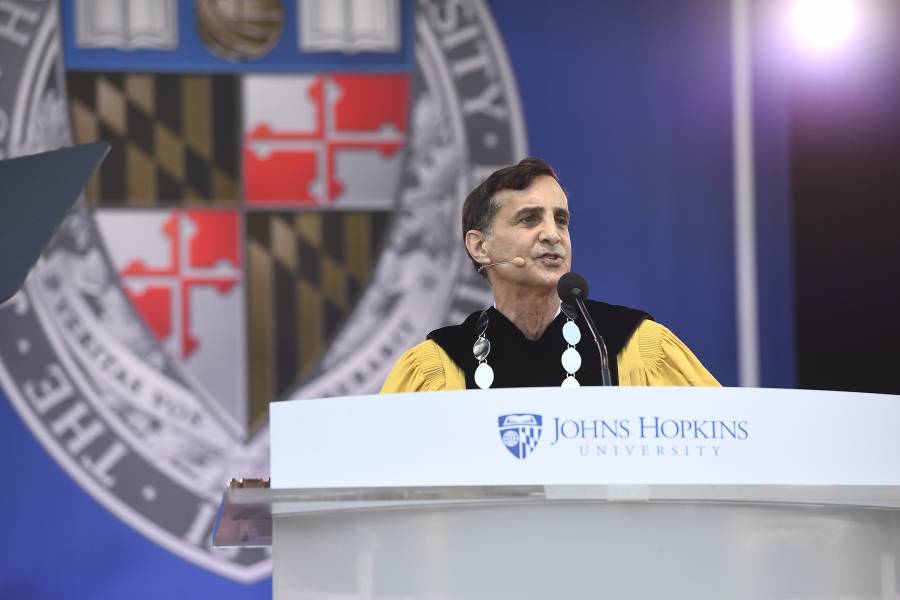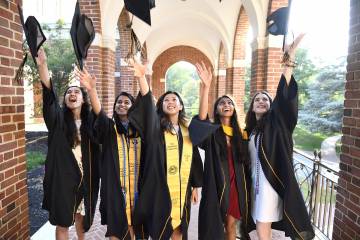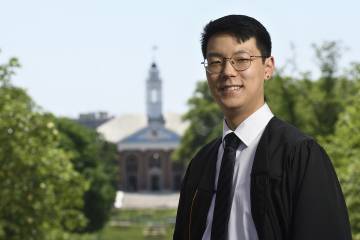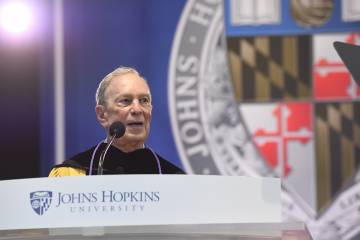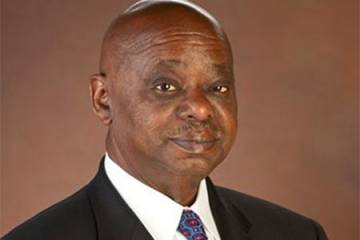Remarks delivered by Johns Hopkins University President Ronald J. Daniels at the universitywide Commencement ceremony on May 27, 2021.
Wow. Wow. Wow.
I am just savoring this moment.
We are all here. Together. On historic Homewood Field.
With a spirit of celebration, gratitude and optimism, as we mark the 145th Commencement ceremony of Johns Hopkins University. And so, let us begin.
To our alumni and trustees; to our faculty and staff; to our parents, family members and friends; to our distinguished speaker, Mayor Mike Bloomberg; and most especially to our graduates …. welcome to the Johns Hopkins University Commencement for the great Class of 2021!
To the Class of 2021, you did it. You made it to the finish line in circumstances that were more than a tad challenging. In the face of the most devastating international pandemic in more than a century, you kept your moxie, your equilibrium, your focus. You didn't just muddle through your final year at Hopkins—you soared. You found inventive ways to keep the rich tapestry of campus life alive, on and off of Zoom. And you took seriously our shared responsibility for our community's public health.
You completed—wait for it—67,000 COVID saliva tests, requiring 337,000 minutes of your time and roughly give or take 4,563 ounces of your saliva. For the record, Mayor Bloomberg, I know you'd be interested, our experts have determined that this is enough saliva to fill one large bathtub or for someone to take two, very long showers.
You also were among the first to jump on the Blue Jay shuttle to get your vaccinations, and to volunteer at the mass vaccination site here in Baltimore.
Thank you. Thank you. And thank you.
We know that for all the ways in which you've stepped up, you also bore the burden of the pandemic's dizzying discombobulation. As governments and public health organizations tried to manage this disease, you were hemmed in, and perhaps bewildered, by the onslaught of new rules and strictures. As millions were confined to their homes, you were forced to find new ways to maintain meaningful human connections. As the global economy faltered, you worried about family members and friends losing jobs or burning out. And as the virus spread from country to country, you witnessed extraordinary suffering and loss, including among people whom you love.
This was a disruption of historic dimensions that left no one unscathed.
Yet it was also a historic opportunity.
You see, even as we persevered through the day to day struggles of the last year-plus, the ruptures rent by COVID allowed us—and in some cases forced us—to see in stark relief aspects of ourselves and our world that had been too long ignored or overlooked. The pandemic gave us a rare chance not only to examine our world anew, but also to think and act anew.
Perhaps because I am a baby boomer from Canada, I found myself returning to a particular lyric penned by the late Montreal-born poet and songwriter Leonard Cohen: "There is a crack, a crack in everything. That's how the light gets in."
Cohen was born in 1934. By the time he recorded that line for the first time, in 1992, he had absorbed the atrocities of the Holocaust, lived through the terrifying nightmare that was the Cold War, and witnessed the democratic uprisings that led to the dissolution of the Soviet Union and the fall of the Berlin Wall.
He had seen for himself the cracks, the fractures, the broken shards of our world, but he had also glimpsed the light and the possibility those fissures let in.
For me, Cohen's words resonate powerfully in this moment.
Last year, almost overnight, everything seemed to crack at once, and in turn forced us to see more of that which had been hidden in plain sight. The sudden pivot in March 2020 to remote schooling and work showed us the flaws and gaps in our nation's education system and technological infrastructure. Precipitous job losses laid bare the holes in our social safety net that leave too many hungry and uncared for. The subversion and distortion of scientific facts within the echo chambers of social media stoked the polarization that has been tearing the fabric of our society for years. And the disparate impact of the pandemic on communities of color—coupled with the murders of George Floyd and so many other Black Americans, as well as rising violence against other historically marginalized groups—reminded us yet again how far we have to go to realize fully America's founding commitment to equality and liberty for all.
And as these painful cracks were laid bare, we heard also the calls for real, ambitious reform; we witnessed the acts of solidarity and compassion; we felt the possibility of enduring change.
There is a crack in everything, but that's how the light gets in.
We know from experience (and from the literature) that there are moments in the history of a society or an institution or a life that are so disruptive and so wrenching that they upend everything. All bets are off. Economists and political scientists call such moments critical junctures. And critical junctures represent that rare opportunity for lasting, non-trivial, meaningful change. They are a chance, as Cohen says elsewhere in his song, to "ring the bells that still can ring."
The cracks we now see, in the world we once knew, afford us the space, the ability to make decisions and to take actions that we might never have dreamed of otherwise—whether that's marshaling the strength and the courage to ensure that the stirring promise of this country's founding ideals is made available to every American, or pursuing a particular path or passion or idea in our lives or careers that we could never have imagined in the "before times"—something your commencement speaker Mike Bloomberg and our honorary degree recipient Ernie Bates both know more than a little about.
Class of 2021, we cannot wait to see how you will transform the flickers of light before us into a luminous beam of hope. You are our beacons. Lead us toward a healed—toward a better—world.
Congratulations again on your remarkable achievements in a remarkable time.
Godspeed.
Posted in University News, Student Life
Tagged commencement 2021




